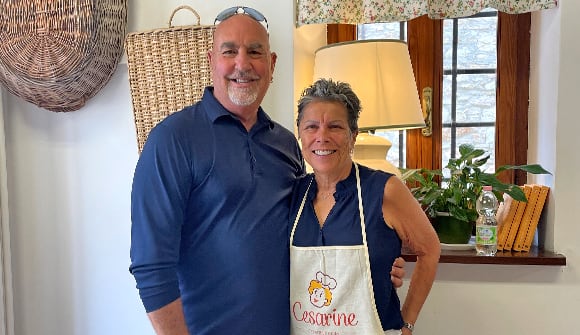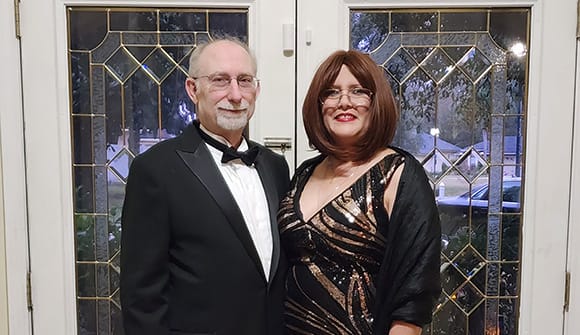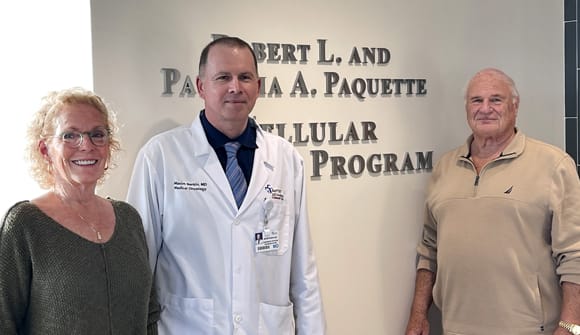Cleared for takeoff
Throat cancer survivor resumes his quest for solo flight.
Article Author: Johnny Woodhouse
Article Date:
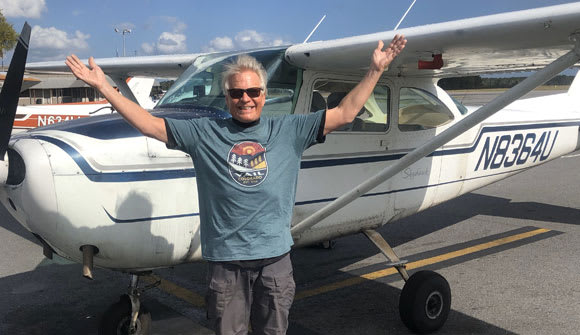
Fred Wagoner has dreamed of flying airplanes since he was a little kid.
In 2019, he took a “discovery” flight with an instructor pilot at Jacksonville’s Craig Airport, which allowed him to experience what it’s like to fly without the commitment of a full flight training program.
“I fell in love with it right away,” he said.
But a year later, COVID-19 scuttled his flight plans.
Prior to his first flight, 68-year-old Wagoner, who never smoked in his life, had been dealing with a raspy voice for several years.
“I thought it was allergies, but it wasn’t. It was my body talking to me, but I wasn’t listening,” he said.
In 2020, his family physician, Richard Valenzuela, MD, of Baptist Primary Care Arlington, convinced him to get an MRI scan of his throat. The images revealed a horseshoe-shaped lesion on his vocal cords.
“I thought they could just take it out and I would be fine,” said Wagoner.
Sound advice
He was referred to Baptist MD Anderson Cancer Center for treatment. Faisal Ahmad, MD, FACS, a head and neck surgical oncologist at Baptist MD Anderson, recommended Wagoner undergo a total laryngectomy, a surgery to remove his voice box.
“He said he would walk me through the whole process. That’s what impressed me about Dr. Ahmad,” said Wagoner.
Before undergoing any treatment, Wagoner experienced severe swelling in his throat due to an infection in the tumor and was admitted to the Emergency Room at Baptist Medical Center Jacksonville.
“I was in the hospital for 10 days. At that point, I had the tumor removed,” said Wagoner, who underwent six weeks of radiation after his surgery to make sure all the cancer was eliminated. “Afterward, I went through a phase where I couldn’t talk at all. That’s when the speech therapists at Baptist MD Anderson become your best friends because they help you with any swallowing issues and are masters at helping you restore your communication skills."
He added, “I’ve worked with three different therapists at Baptist MD Anderson, and they're excellent at what they do.”
Restoring his voice
After being cancer-free for a year, Wagoner was eligible for a device known as a tracheoesophageal voice prosthesis (TEP), which allows individuals to speak after their larynx and vocal cords have been removed. The device works by directing air from the lungs through a valve in the tracheal wall, into the esophagus, causing the tissue to vibrate and produce sound.
Before receiving his TEP implant, Wagoner read a popular book on the art of flying that rekindled his desire to be a pilot. In February 2023, he returned to the cockpit for the first time since the pandemic, utilizing a push-to-talk medical device known as an electrolarynx around his neck to communicate with his instructor pilot and the control tower.
“I tried it for a couple of flights, but it was difficult,” he said. “I didn’t even know if they would allow me to flight train without a voice.”
Since then, Wagoner has upgraded to a hands-free TEP device, which allows him to speak without manually blocking the opening in his throat (stoma).
“It’s a gamechanger. It’s never failed me in a critical moment, whether flying or teaching Sunday School at my church,” he said.
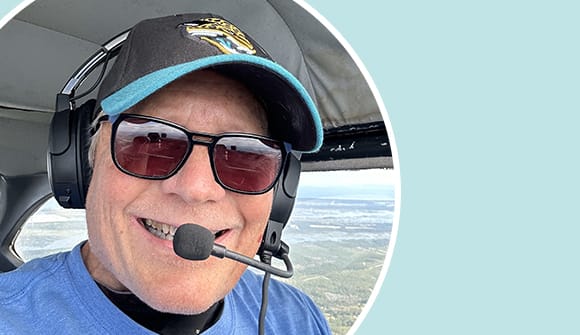
Determined to fly
With more than 60 flight hours to his credit, Wagoner has completed several night flights and made touch-and-go landings at Jacksonville International Airport. He’s even shared a runway with a Blue Angels aircraft at Cecil Field.
“Now, all I want to do is fly solo. I want to take off, fly the pattern and land without my instructor saying a word. That’s the goal,” he said. “Thanks to Dr. Ahmad and the speech therapists at Baptist MD Anderson, I’m back in the cockpit and on my way to earning a private pilot’s license.”
Early detection is critical when it comes to several types of throat cancer. To schedule an appointment with a Baptist MD Anderson Cancer Center specialist, call 1.844.632.2278.

